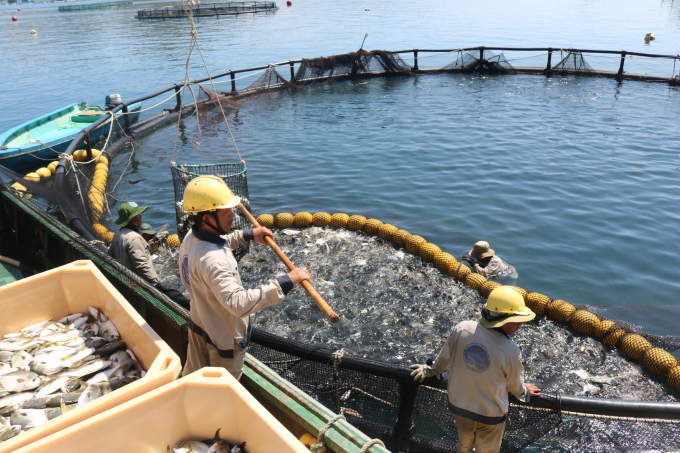June 6, 2025 | 23:27 GMT +7
June 6, 2025 | 23:27 GMT +7
Hotline: 0913.378.918
June 6, 2025 | 23:27 GMT +7
Hotline: 0913.378.918

Fees for appraisal of conditional business in the field of aqua feeds and products for the treatment of aquaculture environment range from VND 1.5 million to VND 5.7 million per time. Photo: Kim So.
The Ministry of Finance is collecting comments on the draft Circular stipulating the rate, collection, payment, management and use of fees and charges in the field of quality management of aquaculture materials.
According to the draft, the expected collection rate is as follows:
The fee for issuance of registration certificate for publication of standard conformity and announcement of technical-regulation conformity for imported aquaculture materials is VND 50,000 per time.
Fee for appraisal and issuance of certificates of imported aquaculture materials isVND 470,000 per time.
Fees for appraisal of conditional business in the field of aqua feeds and products for the treatment of aquaculture environment range from VND 1.5 million to VND 5.7 million per time.
Fees for appraisal, recognition, appointment, supervision of laboratories and testing facilities in the field of aquaculture are VND 5.7 million per time.
In addition, the draft also proposes to abolish some fees and charges. Specifically, abolishing the fee for recognition of the quality of agricultural materials permitted for circulation in Vietnam; abolishing the fee for assessment and issuance of certificates of circulation of aquaculture products and materials.
The Department of Agriculture and Rural Development of the provinces and central run cities are in charge of collecting fees on activities such as public services or state management.
Other fees are collected by organizations, including: Directorate of Fisheries; Center for Supervision, Test and Accreditation of Aquaculture; state management agencies in charge of fisheries in provinces and central run cities.
Charge and fee-collecting organizations shall transfer all collected fees and charges into the state budget, except for the cases as legally deducted to cover expenses.
The source of expenses to cover the performance of the work and the collection of fees shall be arranged by the state budget in the estimate of the collecting organization according to the state budget expenditure regulations.
It is up to 90% of the collected fee may be deducted to cover expenses for the prescribed expenditures, but only for some kind of state agencies as regulated. The remaining 10% of the fee collected is transferred to the state budget.
Translated by Khanh Linh

(VAN) VAAS and numerous Vietnamese enterprises have signed cooperation agreements with Japanese partners to promote agricultural technology and trade connectivity.
/2025/05/29/5625-12-214801_567.jpg)
(VAN) Provincial mergers in the Mekong Delta promise to streamline administration, expand inter-provincial raw material areas, and foster close linkages in agricultural value chains, benefiting both businesses and cooperatives.

(VAN) Merging Mekong Delta provinces contributes to the expansion of agricultural raw material areas, addressing previous constraints caused by provincial boundaries. Additionally, this expansion will reduce costs and strengthen linkages between businesses, cooperatives, and farmers.
/2025/05/29/1043-2-153730_145.jpg)
(VAN) The Government's policy to merge provincial-level administrative units opens up major opportunities for the Mekong Delta region to reshape its agricultural development strategy toward large-scale production, effective regional linkages, and sustainability.

(VAN) The mutual export of agrifood products between the European Union (EU) and the United Kingdom (UK) must occur again without certification, border controls or other red tape. This was agreed at the UK-EU summit.
/2025/05/22/5121-2-173645_677.jpg)
(VAN) NBSAP Tracker identifies strengths and areas for improvement in the National Biodiversity Strategy, based on each region’s priorities and capacities.

(VAN) The draft amendment to the Circular on rice export trading stipulates a periodic reporting regime for rice exporting enterprises.